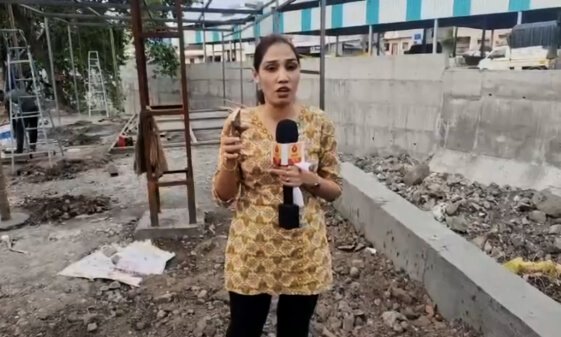Woman Journalist Beaten on Camera, Power Appears to Shield the Accused
Assailant Beat Sneha Barve Unconscious While She Was Filming Alleged Illegal Construction
July 15, 2025
Screenshot from YouTube
A journalist, Sneha Barve, was violently assaulted while reporting on suspected illegal construction along a riverbed in Pune district. The main accused, local businessman, struck her repeatedly with a wooden rod while she was filming a video report. That such an act was carried out in broad daylight, against a woman journalist, while the camera was rolling, shows how deeply the culture of impunity has taken root among individuals who operate close to political power.
Barve had travelled to the site in Nigothwadi village, near Manchar, with her cameraperson and local residents on 4 July after receiving reports of unauthorised construction activity. Just as Barve, founder of YouTube news channel Samarth Bharat Pariwar, began speaking on camera, Pandurang Morde approached and began to assault her without warning, according to the police complaint, as reported by The Indian Express.
Despite Barve collapsing to the ground, the beating continued. Her colleague, cameraperson Ajaz Sheikh, was also attacked when the group realised they were being filmed. Retired police inspector Sudhakar Kale and two of his relatives, who had accompanied them, were injured as they tried to intervene.
Barve was hospitalised with head injuries, including a concussion and internal swelling.
The First Information Report filed at Manchar police station listed offences such as unlawful assembly, grievous hurt and intimidation under the Bharatiya Nyaya Sanhita. These offences carry relatively short sentences, according to Free Speech Collective. Five individuals, including Morde’s sons, were arrested and released on bail. Morde himself was not arrested; police said he had sustained a fracture and was being treated in hospital. They stated that Barve could submit a detailed complaint later and that stronger charges could be added, if required.
The police’s failure to apply serious charges, despite clear video evidence, multiple injured people and a woman journalist attacked on camera, shows a serious breakdown in “state capacity,” or the state’s ability to enforce the law fairly and protect people without bias. When the law is applied based on political connections instead of facts, it loses its meaning.
The police response also shows selective enforcement – the same laws are applied differently depending on who is involved. Instead of treating the case as attempted murder or obstruction of journalistic duty, the police invoked low-penalty sections. They did not file a second FIR based on Barve’s complaint, arguing that one had already been lodged.
The accused attacked a journalist speaking on camera, knowing she was not alone, and fully aware of being filmed. This points to “elite impunity,” a condition in which members of the political or economic elite commit violations with the confidence that legal consequences will either be delayed, diluted or dismissed altogether. This confidence appears to stem from alignment with patron-client networks, which are informal arrangements where political support is exchanged for protection, access, or favourable treatment.
Another important concept in understanding this case is the erosion of the rule of law. Rule of law implies that all individuals, regardless of status, are equally subject to the law and its enforcement. But when enforcement is delayed or deliberately weakened for powerful individuals, it suggests that laws are negotiable for those within elite networks.
The silence of Maharashtra’s political actors following the incident functions as a form of passive complicity. Morde is reportedly associated with the state’s ruling alliance. None of the parties in the alliance has issued a public statement condemning the attack. It was be seen as tacit endorsement, or an informal signal of immunity.
Barve’s position as both a journalist and a woman makes the public nature of the attack even more politically telling. These are identities that typically confer a measure of public protection. That they failed to deter the assault indicates that the informal protection enjoyed by the attacker outweighed the institutional safeguards associated with gender or press freedom. This is part of a pattern where the state stops protecting people, and power shifts to personal networks and loyalty instead.
In such contexts, violence becomes a calculated strategy; it’s low-risk and often consequence-free for those whose interests are threatened by public scrutiny.
This has serious consequences. When the police and other agencies act based on political links instead of the law, the state stops being fair. It starts protecting the powerful and targeting those who speak out. Violence then becomes a tool to silence people, not just a crime. Those with power feel safe, while those without face the risks. In the end, the law exists in name, but real control lies with those who have influence.
You have just read a News Briefing by Newsreel Asia, written to cut through the noise and present a single story for the day that matters to you. Certain briefings, based on media reports, seek to keep readers informed about events across India, others offer a perspective rooted in humanitarian concerns and some provide our own exclusive reporting. We encourage you to read the News Briefing each day. Our objective is to help you become not just an informed citizen, but an engaged and responsible one.

